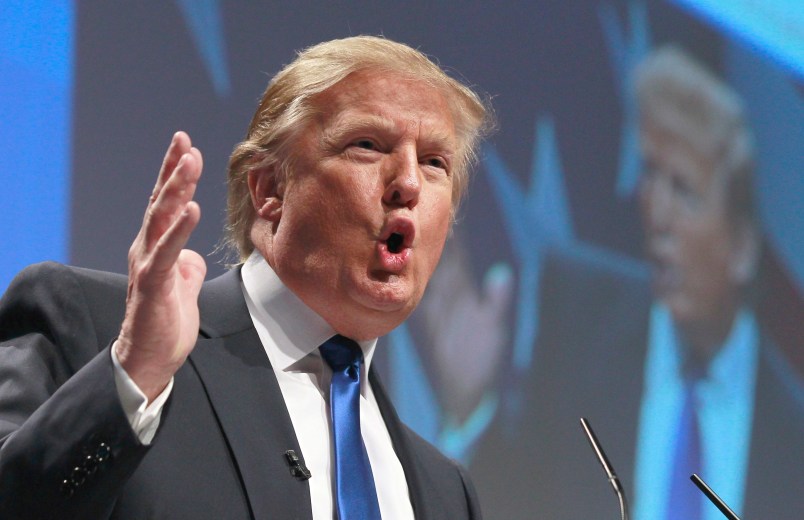From Jon Stewart’s gleeful celebration on The Daily Show to Stephen Colbert’s pitch-perfect parody, Donald Trump’s announcement of his campaign for the presidency has been met with the mockery it seems to deserve. Judging by the “content” of his announcement speech, Trump plans to continue playing the role of the extremist right-wing id that he perfected for a time during the 2012 campaign (during which he flirted with but never actually declared a run). At that time he mostly focused on voicing birther conspiracy narratives about President Obama; this year’s announcement included xenophobic assaults on Mexican immigrants and paranoid pronouncements about ISIS and China.
Yet if such sentiments help explain to what base Trump hopes his candidacy will appeal, they don’t quite explain why Trump is iconic enough to run for president in the first place. For that, I would turn to the most succinct and perhaps the only logical statement from Trump’s announcement: “I am very, very rich.” And if Trump’s political and cultural views locate him firmly at our society’s lunatic fringe, his status as an icon of mythologized wealth connects him to a set of much more widespread and deeply rooted American narratives.
As with a great deal of our national myth making, these narratives originate with Benjamin Franklin, and more exactly with Franklin’s self-fashioning in his published works. In telling his life story in his two-part Autobiography, Franklin both helped coin a dominant version of the American Dream and linked it two equally longstanding national narratives: the rags-to-riches and self-made man stories. As best we can tell, those narratives were quite accurate to the circumstances of Franklin’s life and journey. But in his literary depiction of them, he turned them into a more overarching set of narratives for readers and fellow Americans to embrace and pursue, right alongside the autobiography’s famous “project for moral perfection.”
Moreover, Franklin connected those images of his own life and success to the subject of one of his first published works, The Way to Wealth (1758). Published when Franklin was already a hugely successful Philadelphia printer, entrepreneur, and philanthropist, Way imagined such iconic success as the natural goal for all his readers, using the aphorisms and advice of Franklin’s annual Poor Richard’s Almanack to convey that goal to the common man. Throughout his life, Franklin embodied a learned, literate, scientific, inventive, politically and socially engaged, civic-minded set of ideals—and he did so by consistently connecting that iconic identity to his financial success.
Despite our professed democratic ethos, time and again in the centuries since Franklin the wealthiest Americans have been our symbols of the American Dream. From Early Republic figures like John Jacob Astor and Jay Gould to the Carnegies and Rockefellers of the turn of the century, through 20th century icons like Henry Ford and Andrew Mellon to Warren Buffett, Bill Gates, and others in our own moment, these unfathomably rich figures have been synonymous with national narratives of success. Just as is the case with Trump—who inherited his real estate empire and who has declared bankruptcy multiple times—the realities have often diverged substantially from the mythologies. But the mythologies have endured, at least as fully and thoroughly as any national ideals of freedom or equality.
I’m not saying that President Donald Trump should be anything other than a satirical punchline—nor that Trump and Franklin are a matched set. Yet until we can engage with how closely our most foundational and enduring national narratives are linked to iconic images of wealth and success, we’ll be missing a vital context for Trump’s candidacy.
Ben Railton is an Associate Professor of English at Fitchburg State University and a member of the Scholars Strategy Network.







Comparing Trump to Franklin must have Ben rolling over in his grave, the only thing they have in common is fathering a child out of wedlock.
People believe there must be some logical connection between extreme wealth and intelligence, no matter how long or how often The Rump disproves the hypothesis empirically.
sR:dr (spotted Railton:didn’t read)
Camels attempting to pass through the eye of the needle.
It could be wealth envy but it seems simpler even than that. The conservative mind is ripe to be led astray. Opportunists like Huckabee, Romney and Trump just play on the mental weaknesses and innate desires to be led that is the main component of conservatism. It damned for sure isn’t being conservative that’s one thing we know for sure.
Someone paved the way, but I wouldn’t say that it goes as far back as Ben Franklin. Nixon with the divide and conquer southern strategy made a huge swath of the nation imagine themselves as better than the other half of the huge swath of the nation. Greed set in and helping thy neighbor exited stage left.
Money and wealth replaced kindness and caring and those with a bit of wealth respect those with a bit more and their life’s focus becomes, get to the next level as fast as possible and by all means.
Equality can not exist where class envy thrives. Those who hold Trump on high basically deny their own existence and live through a fairy tale always focused on what might be instead of what really is. They are told that money is what matters and the need to have an authority over them causes them to follow this advice.
Conservatism paved the way for neo-conservatism which paved the way for wealth through phony political posturing. Its hucksterism in the most modern mode.